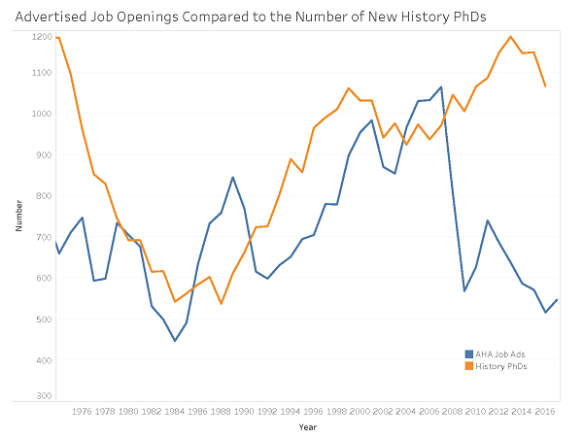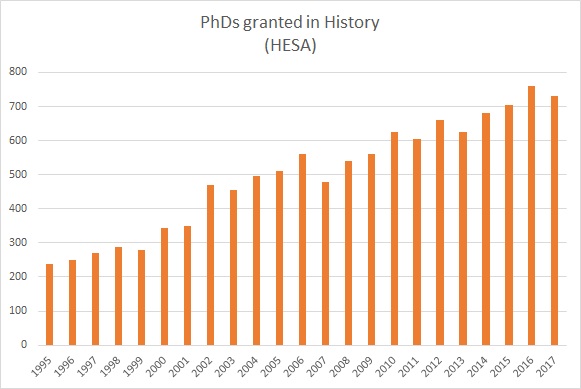Brodie Waddell
This is the time of year when many people are applying for PhDs or academic jobs and discussions of the current job market inevitably arise. A couple of years ago, I wrote a series of posts on job listings, doctoral cohorts and staff/student numbers, trying to provide some data to help inform these conversations, but I think it is time for an update. How have things changed since then?
The American Historical Association publishes its notorious chart of doom each year, showing the terrible ratio of new PhDs to advertised jobs, and its most recent version leaves little room for optimism.

AHA Jobs Report 2019
In the UK, we lack a consistent, accessible annual list of academic history jobs. Although nearly all such posts are advertised on jobs.ac.uk, there is no easy way to turn these adverts into an annual figure except by manually monitoring and recording. So, instead, I’ve taken to focusing on the only reliable data that is publicly available: staff and student numbers.
HESA has published figures for full-time-equivalent staff in the subject of History for 2014/15 to 2017/18. The IHR has figures for teachers of history in higher education for selected years going back many decades, but ending in 2012. Conveniently, the HESA staff numbers for 2014 and the IHR numbers for 2012 are quite close, which suggests that they can be combined into a single series.

HESA also have figures for PhDs granted in History for the same period and, previously, going back to 1994/95, though the earlier period no longer seems to be online.

What do the numbers show? The headline is depressing. The number of PhDs has increased dramatically over the last thirty years, but the number of staff has grown much more slowly. As a result, the number of PhDs granted annually per member of staff increased substantially between 1995/96 and 2005/06. The number of PhDs granted per lecturer continued to grow more gradually and fitfully until sometime between 2012 or 2014.
The only ‘good news’ is that the trend seems to have levelled off since 2014/15. In other words, perhaps the job market has stopped getting worse.

However, the overall ratio is deeply worrisome. Currently about one PhD is granted each year for every five current full-time staff in History departments. If all of those new PhD holders sought academic jobs, about 20 percent of the academic workforce would need to retire each year to open up enough posts. Or History departments would need to expand their staff numbers by 20 percent per year. Or some combination of both. None of those options are likely.
What should we, as a profession, do about it? I’ll summarise my previous recommendations because while some promising initiatives such as ECA Survival have begun, there is still much to do on all these issues:
1) Publicise ‘official’ information about the academic job market for potential doctoral students.
2) Annually collect and publicise ‘official’ data on the state of history in universities.
3) Investigate and publish data on casualisation.
4) Publicise information about alternatives to academia.
5) Provide training, support and experience in alternatives to academia.
6) Pressure departments to hire responsibly.
7) Organise.

There are a couple of aspects of this data that strike me as worth commenitng on. First, that the number of employed historians has increased by some 25% since 1995. Arguably, this increase was in response to undergraduate numbers, and represents a rising staff/student ratio, but nevertheless is not quite the story you might expect. Adding in the 15 years before 1995 would tell a rather different and more complex story. And the other is that it does not capture funding for PhDs as opposed to PhD numbers, which I believe has remained largely unchanged (at least via the AHRC). My experience has been that many institutions encourage part-time PhDs for REF purposes, but that the funding bodies have been seeking to massage and manage the PhD pipeline for at least the last couple of decades. In the 2000s you could regularly expect to get 250 applications for an early modern lectureship, but the last appointment process I participated in this field did not get half this number of applications (this could just reflect the sub-field!). In other words, there are few enough lectureships, but presenting the issue as a simple one of supply and demand misses alot of the factors that shape recruitment and the experience of ECRs and PhD students.
Thanks for the comment, Tim!
Regarding undergrad student versus staff numbers, I looked at this in a previous post and found that the ratio was fairly stable (at least when compared to PhDs) from 1995 to 2015. So, yes, the narrative of worsening UG/staff ratios may be exaggerated.
Regarding PhD funding, this is something I don’t know anything about, so thanks for the information about this. The stagnation in AHRC funding for PGRs is disappointing but unsurprising and, given the post-doc job market, perhaps justifiable?
Regarding unfunded and/or part-time PhDs, and their relationship to the academic job market, this is huge issue where there seems to be little data. What would be ideal would be a survey of incoming PhDs about their post-PhD intentions, so as to at least get a sense of how many of these c.700 new PhDs each year are entering the market. Sadly, this doesn’t exist! And, even if it did, there is also a substantial grey area of PhDs who are interested in academic employment but have other routes planned/anticipated. Some of this came up in the conversations a couple years ago, which is still relevant today… Here: https://manyheadedmonster.wordpress.com/2015/09/08/students-phds-historians-jobs-and-casualisation-some-data-1960s-2010s/#comments
And here: https://manyheadedmonster.wordpress.com/2016/02/29/students-phds-historians-and-jobs-199495-201415-feb-2016-update/#comments
Dear Brodie, Thanks for responding. I am sure you know Ben Schmidt’s work in this area in North America – but just in case see http://sappingattention.blogspot.com/2018/07/mea-culpa-there-is-crisis-in-humanities.html and related posts. My feeling is that it is important to disagregate the PhD from the employment market (which feels like a recurring theme in the comments). Arguably, the voluntary self-funded PhD is fine, though it has become progressively more expensive. My impression is that it is doing the work that the people who undertake it, want it to – to give structure and validation to intellectual commitment. And while some people aspire to use this route to academic employment, no responsible supervisor would be other than honest about the chances of doing so. At the same time, I believe that both the funding of PhDs, and the recruitment of ECR staff are fundamentally broken. Just doing a class, race and background survey of ECRs would demonstrate the extent to which a highly skewed selection is at play, with the people getting through that selection process being increasingly drawn from upper middle class, white, Oxbridge educated candidates. Working class – much less BAME – ECRs are increasingly rare in my experience (and more power to the few that have gotten through this brutal process). Partly this is a simple result of the hierarchical nature of British HE – and the connivanvce since around 2011 of UKRI – in seeking to push ‘selection’ ever earlier in a career path. The current funding system of ‘consortia’ was created in response to Oxbridge complaints that their favoured canditates weren’t being automatically funded (I was a protesting voice on the committees at the time). The system is rigged to privilege Oxford and Cambridge. I also remember with real distaste, when the AHRC brought in its programmes for ‘rising stars’ and ‘leaders of tomorrow’ and the BBC, its ‘New Generation Thinkers’ – all designed to ensure that the heights of the academy and public discourse are monopolised by the same old dull Oxbridge selected candidates – in a careerist lockstep from public school, to oxbridge college, to funded PhD, to first grant, to P-I on major research initiative – with Radio 4, and the odd documentary for variety’s sake. These programmes were sold as opportunities for anxious ECRs to shortcut their way to security and success; but really (and with a few exceptions) they simply embed privilege. In other words, it just seems to me that the relationship beteween PhDs and jobs, fails to measure the extent to which history – as a discipline and profession – has become more exclusive and privileged. My feeling is that we need to measure the outcome of this process – and its failure to recruit a profession that bears any relationship to the many communities of memory with which we are entangled.
Sorry, this went on longer than I intended!
One way of capturing data about future intentions/aspirations is to request from HEIs data on the ages of PhD candidates to construct an age profile of this population. It would provide an approximate measure or surrogate of the potential intentions (approximate).
As to the class basis of recruitment, well, as one of those from the so-called ‘unskilled’ working-class backgrounds, I’ll leave that to others.
A commment from Christopher Thompson, via email:
This is a sorry story but one that has been running for a very long time. As long as the university sector awards more Ph.D. degrees than there are posts for successful candidates to fill, then there will inevitably be talented historians unable to gain either temporary or part-time work and more still who are obliged to seek employment elsewhere. Of course, there will be some people who do not want to secure full-time academic posts. But universities benefit from this surplus of well-qualified postgraduates to teach their courses and to keep salaries lower than they should be. Better information for frustrated Ph.D. candidates and better organisation on the part of historians will not, I am afraid, do enough to resolve these issues.
I know I have commented to this effect before but historians in my view need to re-examine how the discipline is organised. We need more than just the formal apparatus of history/humanities departments and learned societies. There are other ways of using modern technology to create informal groups or, perhaps, institutions to cater for those committed to the discipline but unable to gain permanent posts. Online seminars and conferences, new electronic journals, access to periodicals, specialist websites, all these ought to be under wider consideration to help to keep those committed to advanced historical studies engaged with their more fortunate colleagues and with their academic interests. The time to act rather than to discuss has come.
Pingback: Why do a PhD in History? A look at the data | the many-headed monster
Pingback: Jobbing Historians: Tales from the Blarchive | the many-headed monster